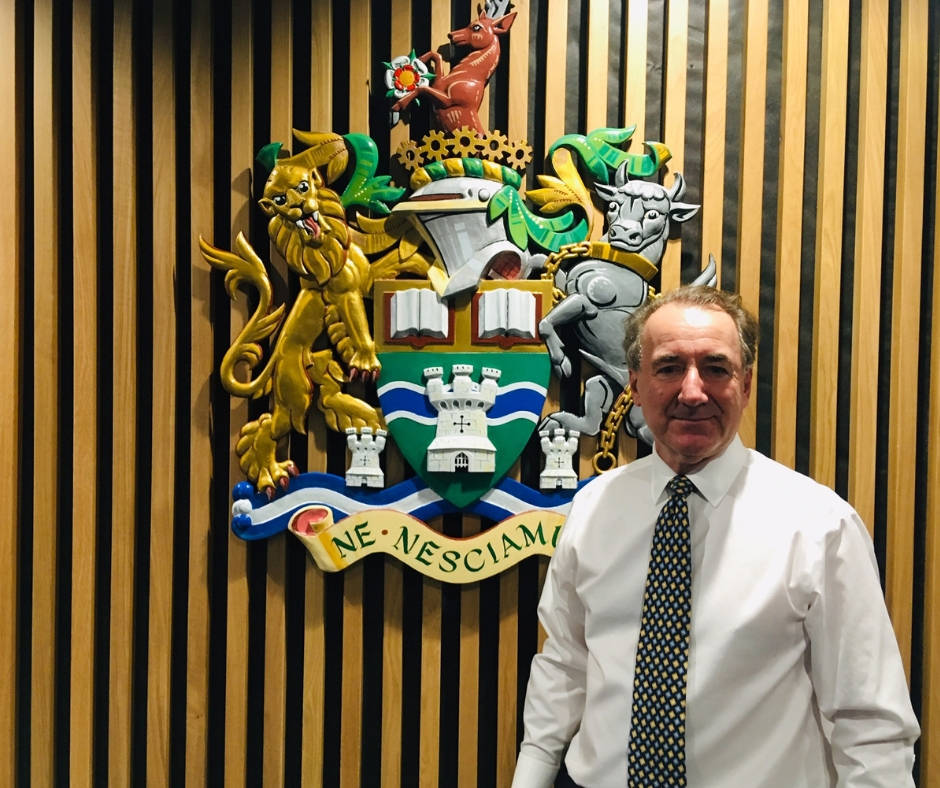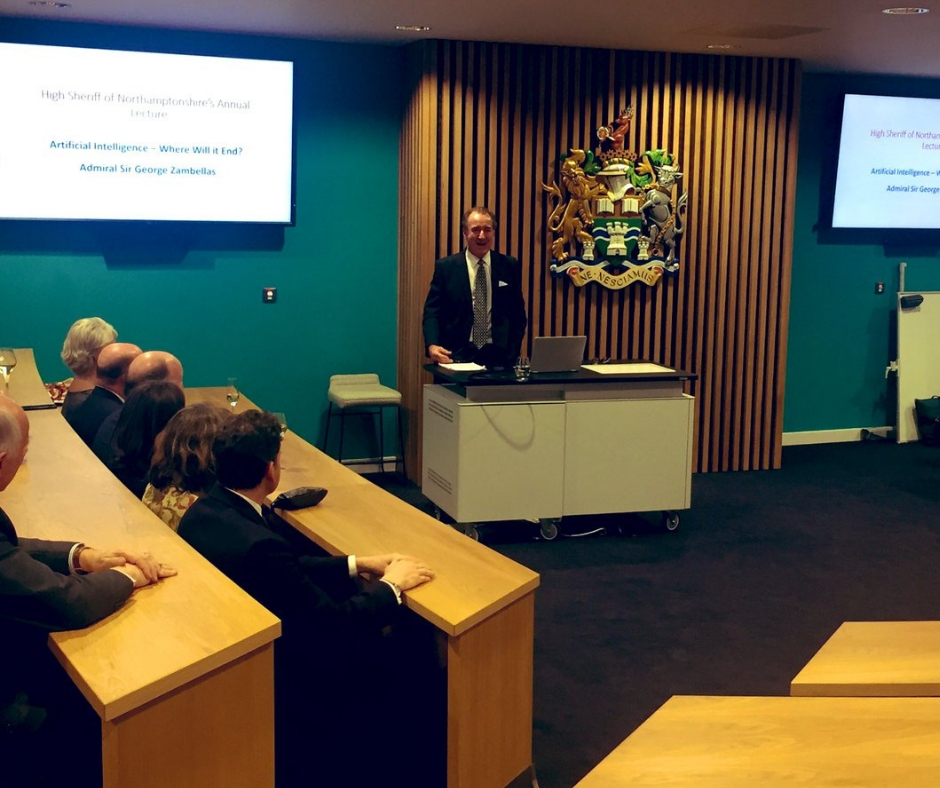In conversation with…Sir George Zambellas
Date 13.02.2019

This week we welcomed the former First Sea Lord of the British Royal Navy, Admiral Sir George Zambellas GCB DSC DL FRAeS to the University of Northampton, as he delivered the annual High Sheriff’s speech.
A close friend of the High Sheriff of Northamptonshire, James Saunders-Watson, Sir George has had a varied and illustrious career – with an extensive background in maritime war fighting, maritime security and joint command.
George began his 36 year Naval career as a helicopter pilot; embarked in frigates and carriers, before a series of sea commands, culminating in the command of the UK Amphibious Force, the UK Maritime Force, NATO 4* Maritime Command and the Fleet.
He completed a three year appointment as First Sea Lord in April 2016, where he oversaw the reset of the Royal Navy’s authority and focus, in the Strategic Defence and Security Review.
A tech addict at heart, George has worked extensively with emerging technologies including Cyber-security and Artificial Intelligence (AI). He is chairman of praXec Limited, founder and chairman of CobWeb Cyber Security and a strategic advisor to Liquid Robotics Inc, among numerous other business interests.
An engineer by training, George’s particular passion is for shaping and supporting fresh thinking within the top management of emerging technical sectors, and for leading-edge technologies – such as unmanned vehicles, AI, cyber resilience, next generation computing, big data processing, bio-engineering and advances in quantum mechanics.
We sat down with Sir George to discuss his thoughts on the future of AI, the UK post-Brexit, Waterside and the future of higher education…
Which areas did you cover in your lecture?
In my lecture I discussed artificial intelligence – but not in a complicated and technical way, which I think would bore people, or probably frighten them. But how it works, what it is and particularly I ask the question – where is it going to end? Because we all want to know and want have a discussion around what the future looks like when it comes to artificial intelligence.
“…the importance of technology can’t be overstated, our lives now are going to be driven by technology, data and artificial intelligence.”

You have spent your career working with technology – most recently Cyber-security and Artificial Intelligence. How big of an issue will AI become for students in the future?
My first love is technology in general, I began my career as an aerospace engineer and I spent some years flying in the Navy, so I’ve got a very specific technical background. I think the importance of technology can’t be overstated – our lives now are going to be driven by technology, data and artificial intelligence. For example, students are probably preparing for careers today; possibly in Law, possibly in Accountancy, possibly in medicine and those jobs may not be there for them as a result of AI in 10-20 years’ time. So universities, schools and the Government’s educational policy has to reflect what’s going to change in the years to come, so the students don’t get caught out.
How do you see the future of Higher Education for UK universities?
Universities are an important combination of being a business and a learning centre. Getting the balance right between learning and business is always difficult because on the one hand you are drawn towards making as much money as you can, or to survive in some cases. And on the other hand the purity of academics takes you down an intellectual and learning path only – and getting a balance between those two is key. Now of course the competition between Universities, including attracting overseas students, attracting research, depending on how the research world will change following Brexit – all of those are quite complicated things that are happening in University thinking. So all over the country, Vice Chancellors leading their businesses are trying to work out the best way to get the balance right between business and academics.
What are your thoughts on Brexit?
We need to maintain a very clear sense of purpose as a nation. We have an amazing history. That incredibly long history and the civil wars we’ve had over time that have created the tolerant and balanced society that we are today – those are the skills and characteristics that we need to take forward. So that we end up thinking less about ourselves and more about the society we live in, and working for each other. I think that will give us the chance, whatever the outcome of Brexit, to do a really good job for the UK.
So, it’s your first time on our new campus. What are your first impressions of Waterside?
It’s a bit new and shiny!
How can UoN capitalise on advancements in technology?
It’s all about allowing people to do really well at what they do. Some universities specialise in certain areas of research and technological developments, and others don’t. This university has quite an interesting technology background – and you never know whether some student, that’s either himself or herself and wants to do their own thing, maybe doesn’t perhaps fit in that well with the community – but is so happy learning and that individual turns out to be the next astonishing inventor of some piece of technology – which changes our lives for the better. I always think it’s dangerous to have reservations about people’s backgrounds or what they are interested in – everybody brings their own value to the party.
“…do what you love doing, be yourself and don’t try to be something that you’re not. If you enjoy technology then pursue technology, if you enjoy music or the arts – then pursue that.”
Any advice for students looking to follow in your footsteps?
If students want to follow in my footsteps they have to be themselves, just do what you love doing, be yourself and don’t try to be something that you’re not. If you enjoy technology then pursue technology, if you enjoy music or the arts – then pursue that. Doing what you love is vitally important – because then you do your best job, and that’s what makes life special.